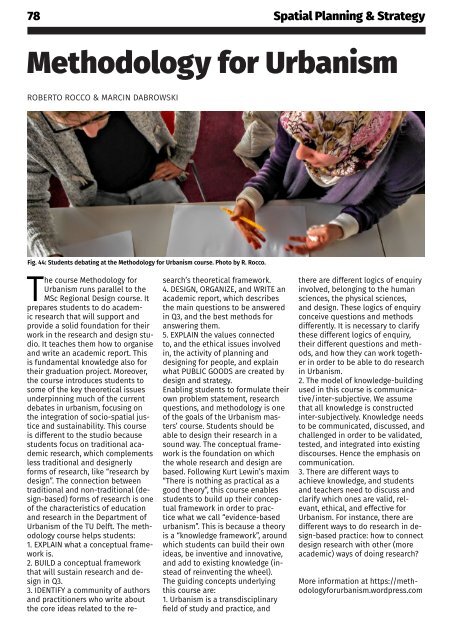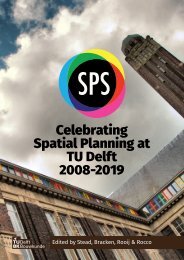*Celebrating Spatial Planning at TU Delft: 2008-2019. Edited by Stead, Bracken, Rooij & Rocco
This is a summary of the achievements of the session Spatial Planning & Strategy of the Department of Urbanism, Faculty of Architecture and the Built Environment, TU Delft, led by Professor Vincent Nadin between 2008 and 2019.
This is a summary of the achievements of the session Spatial Planning & Strategy of the Department of Urbanism, Faculty of Architecture and the Built Environment, TU Delft, led by Professor Vincent Nadin between 2008 and 2019.
You also want an ePaper? Increase the reach of your titles
YUMPU automatically turns print PDFs into web optimized ePapers that Google loves.
78 <strong>Sp<strong>at</strong>ial</strong> <strong>Planning</strong> & Str<strong>at</strong>egy<br />
Methodology for Urbanism<br />
ROBERTO ROCCO & MARCIN DABROWSKI<br />
Fig. 44: Students deb<strong>at</strong>ing <strong>at</strong> the Methodology for Urbanism course. Photo <strong>by</strong> R. <strong>Rocco</strong>.<br />
The course Methodology for<br />
Urbanism runs parallel to the<br />
MSc Regional Design course. It<br />
prepares students to do academic<br />
research th<strong>at</strong> will support and<br />
provide a solid found<strong>at</strong>ion for their<br />
work in the research and design studio.<br />
It teaches them how to organise<br />
and write an academic report. This<br />
is fundamental knowledge also for<br />
their gradu<strong>at</strong>ion project. Moreover,<br />
the course introduces students to<br />
some of the key theoretical issues<br />
underpinning much of the current<br />
deb<strong>at</strong>es in urbanism, focusing on<br />
the integr<strong>at</strong>ion of socio-sp<strong>at</strong>ial justice<br />
and sustainability. This course<br />
is different to the studio because<br />
students focus on traditional academic<br />
research, which complements<br />
less traditional and designerly<br />
forms of research, like “research <strong>by</strong><br />
design”. The connection between<br />
traditional and non-traditional (design-based)<br />
forms of research is one<br />
of the characteristics of educ<strong>at</strong>ion<br />
and research in the Department of<br />
Urbanism of the <strong>TU</strong> <strong>Delft</strong>. The methodology<br />
course helps students:<br />
1. EXPLAIN wh<strong>at</strong> a conceptual framework<br />
is.<br />
2. BUILD a conceptual framework<br />
th<strong>at</strong> will sustain research and design<br />
in Q3.<br />
3. IDENTIFY a community of authors<br />
and practitioners who write about<br />
the core ideas rel<strong>at</strong>ed to the re-<br />
search’s theoretical framework.<br />
4. DESIGN, ORGANIZE, and WRITE an<br />
academic report, which describes<br />
the main questions to be answered<br />
in Q3, and the best methods for<br />
answering them.<br />
5. EXPLAIN the values connected<br />
to, and the ethical issues involved<br />
in, the activity of planning and<br />
designing for people, and explain<br />
wh<strong>at</strong> PUBLIC GOODS are cre<strong>at</strong>ed <strong>by</strong><br />
design and str<strong>at</strong>egy.<br />
Enabling students to formul<strong>at</strong>e their<br />
own problem st<strong>at</strong>ement, research<br />
questions, and methodology is one<br />
of the goals of the Urbanism masters’<br />
course. Students should be<br />
able to design their research in a<br />
sound way. The conceptual framework<br />
is the found<strong>at</strong>ion on which<br />
the whole research and design are<br />
based. Following Kurt Lewin’s maxim<br />
“There is nothing as practical as a<br />
good theory”, this course enables<br />
students to build up their conceptual<br />
framework in order to practice<br />
wh<strong>at</strong> we call “evidence-based<br />
urbanism”. This is because a theory<br />
is a “knowledge framework”, around<br />
which students can build their own<br />
ideas, be inventive and innov<strong>at</strong>ive,<br />
and add to existing knowledge (instead<br />
of reinventing the wheel).<br />
The guiding concepts underlying<br />
this course are:<br />
1. Urbanism is a transdisciplinary<br />
field of study and practice, and<br />
there are different logics of enquiry<br />
involved, belonging to the human<br />
sciences, the physical sciences,<br />
and design. These logics of enquiry<br />
conceive questions and methods<br />
differently. It is necessary to clarify<br />
these different logics of enquiry,<br />
their different questions and methods,<br />
and how they can work together<br />
in order to be able to do research<br />
in Urbanism.<br />
2. The model of knowledge-building<br />
used in this course is communic<strong>at</strong>ive/inter-subjective.<br />
We assume<br />
th<strong>at</strong> all knowledge is constructed<br />
inter-subjectively. Knowledge needs<br />
to be communic<strong>at</strong>ed, discussed, and<br />
challenged in order to be valid<strong>at</strong>ed,<br />
tested, and integr<strong>at</strong>ed into existing<br />
discourses. Hence the emphasis on<br />
communic<strong>at</strong>ion.<br />
3. There are different ways to<br />
achieve knowledge, and students<br />
and teachers need to discuss and<br />
clarify which ones are valid, relevant,<br />
ethical, and effective for<br />
Urbanism. For instance, there are<br />
different ways to do research in design-based<br />
practice: how to connect<br />
design research with other (more<br />
academic) ways of doing research?<br />
More inform<strong>at</strong>ion <strong>at</strong> https://methodologyforurbanism.wordpress.com




